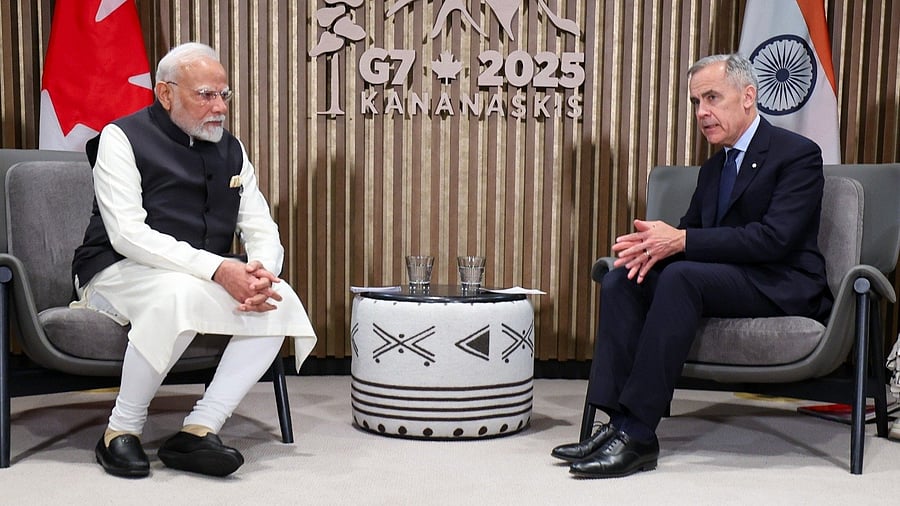
PM Modi meets Canadian PM Mark Carney on the sidelines of the G7 Summit.
Credit: X/@narendramodi
New Delhi: India and Canada on Wednesday agreed to respect each other’s concerns and sensitivities as they moved to rebuild the bilateral relationship, which was wrecked by the murder of a fugitive Khalistani Sikh extremist in the North American nation exactly two years ago.
Narendra Modi and Mark Carney, the prime ministers of India and Canada, agreed to take “calibrated and constructive steps to restore stability in the relationship”, beginning with the early return of Indian and Canadian High Commissioners to Ottawa and New Delhi, respectively. They also agreed to restart the stalled negotiations for a trade deal to pave the way for a Comprehensive Economic Partnership Agreement.
New Delhi had in October 2024 withdrawn its then-envoy to Ottawa, Sanjay Kumar Verma, and his five colleagues, after they had been accused of being involved in the June 18, 2023, killing of Hardeep Singh Nijjar, the fugitive ‘commander’ of the Khalistan Tiger Force, at the parking lot of a gurdwara in Surrey in the British Columbia province of Canada. India had rejected Canada’s request to waive the immunity of its diplomats and make them available for questioning by police. New Delhi had retaliated by expelling Canada’s six diplomats from India, including acting High Commissioner Stewart Wheeler.
Modi and Carney met on the sidelines of the G7 summit at Kananaskis, Alberta, in Canada, notwithstanding protests by a group of Khalistani Sikh extremists near the venue of the conclave. They had frank and forward-looking discussions on the state of India-Canada relations and the way ahead, according to a readout issued by the Ministry of External Affairs in New Delhi.
The two prime ministers “reaffirmed the importance of India-Canada ties, based on shared democratic values, respect for the rule of law, and commitment to upholding the principles of sovereignty and territorial integrity”. They underlined the need to pursue “a constructive and balanced partnership grounded in mutual respect for concerns and sensitivities, strong people-to-people ties, and growing economic complementarities”.
Modi said that he and Carney would work closely “to add momentum to the India-Canada friendship”, with a focus on trade, energy, space, clean energy, critical minerals and fertilisers.
Carney raised the issue of transnational crime and repression during his talks with Modi, thus making an indirect reference to Ottawa’s allegation about New Delhi’s role in the killing of the Khalistani Sikh extremist.
The leaders discussed opportunities for future collaboration in areas such as clean energy, digital transformation, artificial intelligence, LNG, food security, critical minerals, higher education, mobility, and supply chain resilience. They reaffirmed their shared interest in promoting a free and open Indo-Pacific, the MEA stated in New Delhi.
Carney’s predecessor, Justin Trudeau, in September 2023, alleged that the agents of the Government of India had been involved in the killing of Nijjar. New Delhi refuted the allegation, which, however, brought India-Canada relations to a new low over the past couple of years.
A source in New Delhi said that Modi and Carney agreed that while the trial of the four Indians arrested in connection with the June 2023 killing of Nijjar in Canada would continue, in Canada, the two sides would try to avoid any adverse implications for the bilateral relations.
Carney’s predecessor, Justin Trudeau, in September 2023, had alleged that agents of the Government of India had been involved in the killing of Nijjar. New Delhi had refuted the allegation, which had, however, brought India-Canada relations to a new low over the past couple of years. The Royal Canadian Mounted Police had on October 14, 2024, publicly accused the agents of the Government of India of orchestrating criminal activities in Canada.
Modi and Carney discussed opportunities for future collaboration in areas such as clean energy, digital transformation, artificial intelligence, LNG, food security, critical minerals, higher education, mobility, and supply chain resilience. They reaffirmed their shared interest in promoting a free and open Indo-Pacific.
The leaders also discussed the importance of restarting the stalled negotiations on the Early Progress Trade Agreement (EPTA), with a view to paving the way for a Comprehensive Economic Partnership Agreement (CEPA), according to the readout issued in New Delhi.
